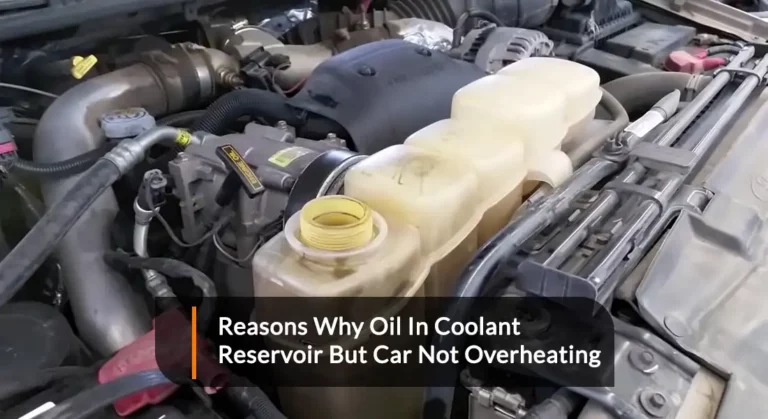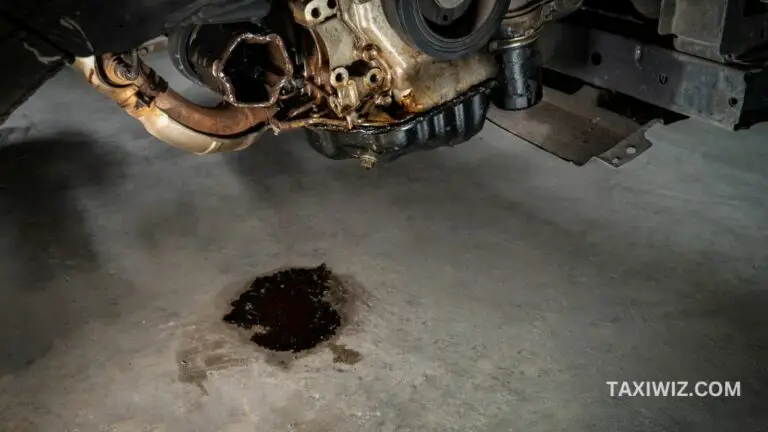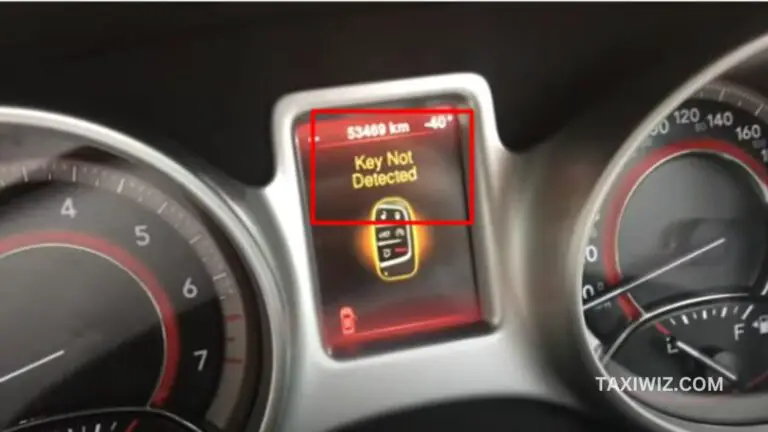Serpentine Belt Noise When Accelerating – [Try This Easy Fix!]
Ever experienced a serpentine belt noise when accelerating? This usually means there’s some sort of issue with the belt (especially the belt tension) or the components that are connected to the serpentine belt.
The possible causes can be:
- Damaged or worn-out belts
- Issues with the pulley & other components
- Misalignment
To stop the serpentine belt noise from generating, you will need to identify the specific problem that is causing the noise and then take action.
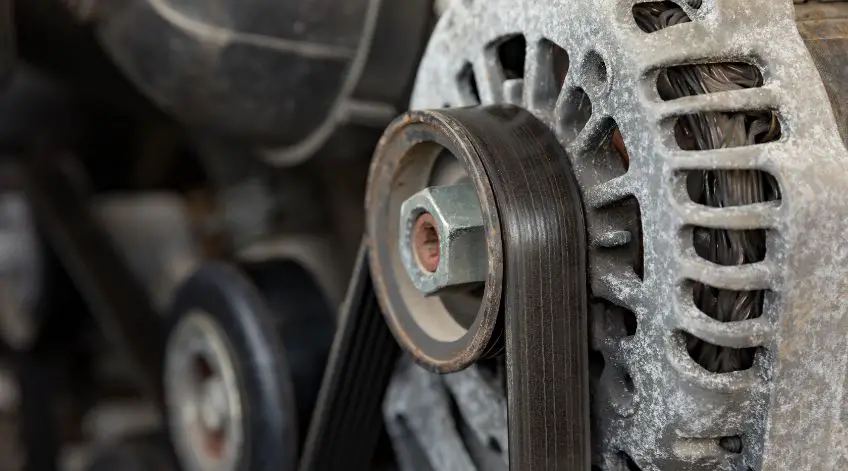
6 Possible Reasons for Serpentine Belt Noise When Accelerating (with the fix!)
1. Damaged or Worn-out Belt
One of the most common reasons for hearing the serpentine belt noise is a damaged belt.
Over time, the serpentine belt will wear down. This is due to the heat exposure that it faces from the engine.
So, when the belt ages, it will start to develop cracks, glazing, fraying, and other issues.
When these issues start to spread all over the belt, the effectiveness of the component will start to decrease.
If that happens then the belt will start to lose grip and start to slip from the pulleys which will result in the belt generating noise.
You will only start to hear the noise during acceleration at first because that is when the belt faces the increased tension. But if you keep ignoring this issue, then the sound will become visible while you drive your car.
How to Fix This
If you find out that, the main reason for the serpentine belt noise was a damaged or worn-out belt, then the only solution is to get a replacement.
You can easily replace the belt if you follow the proper procedure. First, locate where the belt is placed with the help of your car’s manufacturer’s manual.
Then rotate the belt tensioner pulley and release the tension on the damaged belt. This will give you access to the belt.
Simply pull out the old belt and install the new one and follow the previous steps in reverse and your noise issue should be solved.
Related Reading: 6 Reasons Why Does My Serpentine Belt Keep Coming Off
2. Not Maintaining Proper Tension
When the serpentine belt isn’t able to maintain the recommended tension, it will start to generate excessive vibrations, which can lead the belt to create noise.
The belt can either come loose or come short. In both cases, they will start to create noise.
How to Fix This
If the belt is suffering from tension issues, then tightening the belt or loosening the belt should take care of the issue.
That being said, you should check the condition of the belt before you start to tighten or loosen the belt tensioner.
3. Faulty Tensioner Pulley
The tensioner or idler pulleys are directly connected with the serpentine belt and help to maintain the alignment and the proper tension on the belt.
That is why, if they suffer from damage or become faulty, the serpentine belt won’t be able to perform optimally nor will it be able to retain proper tension.
When that occurs, you will start to hear noise from the serpentine belt, when you accelerate your vehicle.
How To Fix This
You will need to inspect the tensioner pulley and see if there are any signs of wear or damage. Depending on the severity of the damage, you may either opt to repair or replace the component.
Sometimes, the pulleys can get stuck also. If that is the case then removing the obstacle should take care of the issue.
4. Belt Misalignment
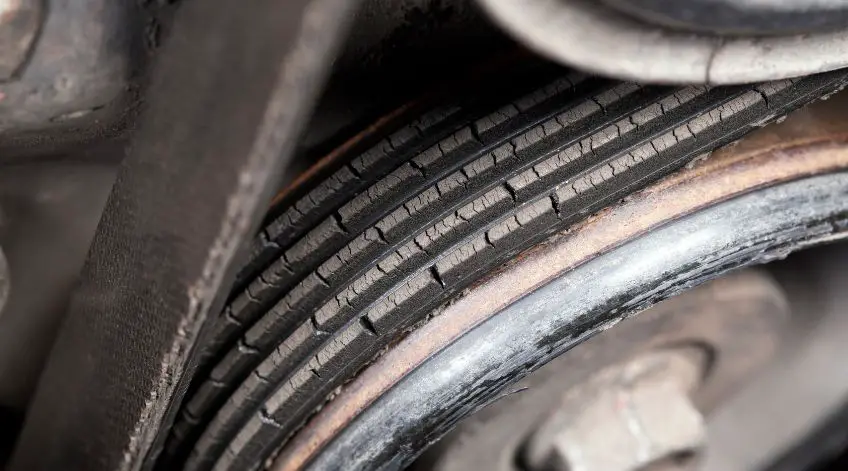
Belt misalignment will often result in the serpentine belt not working effectively and generating an excessive amount of noise.
A properly aligned belt will not only ensure that there is no noise but will also guarantee that efficient power transfer is taking place.
Belt misalignment can be caused by a multitude of factors like loose mountain bolts, damaged components, or a misaligned pulley.
How to Fix This
First, you will need to find what is causing the misalignment and then take action. If it is due to loose screws then just tightening them should take care of the issue.
For some reason, if the belt has just come to a side, then you will have to take it out and inspect it for damages.
If nothing seems out of the ordinary then you can put it back and make sure that it is aligned perfectly this time.
When the pulley or other components are causing the misalignment, you may have to replace those components or repair them.
5. Result of Other Damaged or Faulty Components
Accessory components like the alternator, water pump, air conditioning compressor, and power steering pump – all are connected to the serpentine belt.
Damage or fault in those accessory components may affect the functioning of the belt which may result in generating noises when you accelerate.
How to Fix This
You will have to separately inspect each component and then figure out if they are having issues or not.
If yes, then most of the time you will have to opt for replacement but in some cases, repairs may take care of the issue.
That being said, unless you have extensive knowledge of vehicle parts, finding the main culprit behind the serpentine belt noises due to the accessory components can be difficult, to say the least.
6. Suffering from Contamination
This is rare but there have been cases where the serpentine belt and the pulleys weren’t able to function properly due to debris and dirt falling on them.
So, if the components are contaminated due to oil or coolant, then proper tension or alignment won’t be maintained on the serpentine belt.
When that happens, the belt will start to make noises when you accelerate.
How to Fix This
If you get rid of the contamination then you will get rid of the noise issue as well.
To do so, first, you will need to take out the serpentine belt and the tension pulley. Then you will need to clean them thoroughly and put them back.
If you have cleaned the components properly and haven’t done any damage during the process then your car should be free of the noise.
Read also: Fan Belt Noise When Accelerating – Reasons & What To Do?
Importance of Addressing the Serpentine Belt Noise
Addressing a serpentine belt noise when accelerating is important, to say the least. Here are some of the reasons you should take care of the issue as soon as possible:
- Proper Functionality of Engine Accessories
The serpentine belt drives essential components that are necessary for the proper functioning of your vehicle.
When the belt slips or fails to operate correctly, it can lead to the loss of power steering assistance.
It can also lead to insufficient charging of the battery by the alternator, inadequate cooling from the water pump, or lack of air conditioning functionality.
Resolving the issue ensures the continued operation of these critical systems remains functional and at an optimal state.
- Preventing Further Damage to Related Components
A serpentine belt noise can be a symptom of an underlying problem, such as a damaged belt, faulty tensioner, or failing accessory component.
By ignoring the noise, you may end up experiencing further damage to your vehicle components or a complete failure of the connected systems.
For example, if a worn belt continues to slip, it can cause excessive heat, which may damage other engine components or even lead to engine overheating.
By addressing the issue promptly, you will be able to prevent any extensive and costly repairs down the line.
- Providing Safety Assurance
Proper functioning of power steering is essential for safe and controlled steering.
If the serpentine belt fails to provide power assistance due to slipping or improper tension, it can make steering more difficult, especially at lower speeds or during maneuvers.
If this happens then it will make the life of the drivers quite difficult and may also lead to accidents. This is especially true for beginners.
Therefore, resolving the issue ensures optimal control and safety while driving. That’s why you shouldn’t disregard serpentine noise when accelerating.
FAQs
1. Can a loose or damaged serpentine belt cause a decrease in engine performance?
Yes, a loose or damaged serpentine belt can cause a decrease in engine performance.
2. Can a serpentine belt noise only occur during acceleration?
No, while a serpentine belt noise is more noticeable during acceleration due to increased load and tension on the belt, the noise can occur at other times as well.
3. Can a noisy serpentine belt damage other engine components?
Yes, if the belt slips or fails to operate properly, it can cause excessive heat, increased friction, and additional stress on the pulleys, tensioner, and accessory components.
4. How often should the serpentine belt be replaced?
Generally, it is recommended to replace the serpentine belt every 60,000 to 100,000 miles.
5. Can a noisy serpentine belt be temporarily fixed with belt dressing?
No, it is not recommended to use belt dressing or similar products as a temporary fix for a noisy serpentine belt. While belt dressing may reduce noise temporarily, it can attract dirt and debris, causing further belt slippage and potential damage.

